

What is the rate of incidence for digestive diseases? - Digestive Diseases. Good Digestive Health - Stop Smoking, Healthy Weight, Fiber. Helicobacter Pylori (H. pylori) Infection Causes, Symptoms, Contagion. Symptoms and Causes of Bleeding Ulcers Medical Author: Benjamin C.
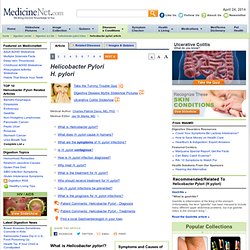
Wedro, MD, FAAEM Medical Editor: Melissa Conrad Stöppler, MD It started with feeling a little run down after working extra hard, perhaps there was some lightheadedness when he stood too quickly, and then came the fatigue. The baseball world blamed Ichiro Suzuki's malaise on playing too much in the World Baseball Classic. During spring training, baseball players are supposed to lounge and gradually get themselves into shape, not play like it's the World Series in October. The scenario plays out routinely off the playing field too often. What is the rate of incidence for digestive diseases? - Digestive Diseases. THE DIGESTIVE SYSTEM. Overview of Digestive Diseases - HealingWell.com. What Is a Digestive Disease?
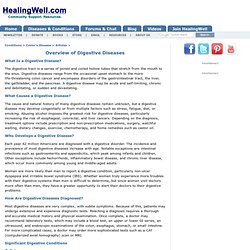
The digestive tract is a series of joined and coiled hollow tubes that stretch from the mouth to the anus. Flash Interactive: Body Basics: Digestive System. Builders Gantry Hoist. Press Release: The 2005 Nobel Prize in Physiology or Medicine to Barry J. Marshall and J. Robin Warren. 3 October 2005 The Nobel Assembly at Karolinska Institutet has today decided to award The Nobel Prize in Physiology or Medicine for 2005 jointly to Barry J.

Marshall and J. Robin Warren for their discovery of "the bacterium Helicobacter pylori and its role in gastritis and peptic ulcer disease" Summary This year's Nobel Laureates in Physiology or Medicine made the remarkable and unexpected discovery that inflammation in the stomach (gastritis) as well as ulceration of the stomach or duodenum (peptic ulcer disease) is the result of an infection of the stomach caused by the bacterium Helicobacter pylori.
Robin Warren (born 1937), a pathologist from Perth, Australia, observed small curved bacteria colonizing the lower part of the stomach (antrum) in about 50% of patients from which biopsies had been taken. Barry Marshall (born 1951), a young clinical fellow, became interested in Warren's findings and together they initiated a study of biopsies from 100 patients. Digestive Diseases Fact Sheets. The Bible Unearthed 1. The Patriarchs. Flash Interactive: Body Basics: Digestive System. Digestive System, Digestion Information, Digestive System Facts, News, Photos. The digestive system is the series of tubelike organs that convert our meals into body fuel.

In all there's about 30 feet (9 meters) of these convoluted pipeworks, starting with the mouth and ending with the anus. Along the way, food is broken down, sorted, and reprocessed before being circulated around the body to nourish and replace cells and supply energy to our muscles. Food on the plate needs to become a mashed-up, gooey liquid for the digestive system to be able to split it up into its constituent parts: proteins, carbohydrates, fats, vitamins, and minerals.
Our teeth start the process by chewing and grinding up each mouthful, while the tongue works it into a ball-shaped bolus for swallowing. Moistening saliva fed into the mouth from nearby glands starts the process of chemical digestion using specialized proteins called enzymes. Once we swallow, digestion becomes involuntary.
Key Players Other organs that play a key role in digestion include the liver, gallbladder, and pancreas. Diseases & Conditions. Good Digestive Health - Stop Smoking, Healthy Weight, Fiber. Proper digestive function begins with good general health.
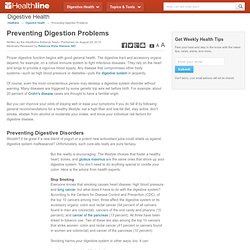
The digestive tract and accessory organs depend, for example, on a robust immune system to fight infectious diseases. They rely on the heart and lungs to provide a vigorous blood supply. Any disease that compromises other body systems—such as high blood pressure or diabetes—puts the digestive system in jeopardy. Of course, even the most conscientious person may develop a digestive system disorder without warning. Many diseases are triggered by some genetic trip wire set before birth. But you can improve your odds of staying well or ease your symptoms if you do fall ill by following general recommendations for a healthy lifestyle: eat a high-fiber and low-fat diet, stay active, don't smoke, abstain from alcohol or moderate your intake, and know your individual risk factors for digestive disease.
Wouldn't it be great if a new blend of yogurt or a potent new antioxidant juice could shield us against digestive system malfeasance? Digestive System. Listen How Digestion Works Digestion Begins in the Mouth The process of digestion starts well before food reaches the stomach.
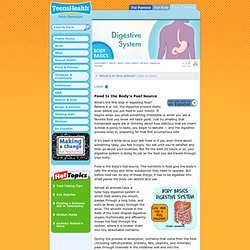
Digestive Diseases. When you eat, your body breaks food down to a form it can use to build and nourish cells and provide energy.
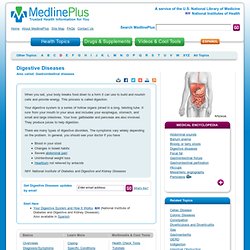
This process is called digestion. Your digestive system is a series of hollow organs joined in a long, twisting tube. It runs from your mouth to your anus and includes your esophagus, stomach, and small and large intestines. Your liver, gallbladder and pancreas are also involved. They produce juices to help digestion. There are many types of digestive disorders. Blood in your stoolChanges in bowel habitsSevere abdominal painUnintentional weight lossHeartburn not relieved by antacids.